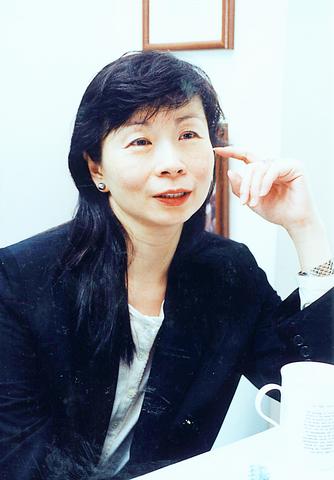Ping Lu (
The ambassador-at-large post is an unpaid quasi-diplomatic position.
Ping was appointed as the director of KHICC in January, but the Hong Kong government has yet to issued her working visa.

TAIPEI TIMES FILE PHOTO
"Based on past experience, government workers who are appointed to work in Hong Kong have to wait three to six months to obtain their working visas from the Hong Kong government," Mainland Affairs Council Vice Chairman Chen Ming-tong (陳明通) told the Taipei Times.
"We have tried our best to push Hong Kong officials on the issue. It is a normal procedure and we think it should be no problem for Ping to work in Hong Kong," Chen said.
There has been speculation, however, that Ping will not be accepted in Hong Kong because of her suspected political leanings.
Ping graduated from National Taiwan University with a degree in psychology. She has a master's degree in statistics from the University of Iowa and is now teaching at the National Institute of the Arts.
The Kaohsiung-born novelist told the Taipei Times that she supported the development of democracy in Taiwan and, as a result, was sympathetic to the DPP and was a moderate dissident during KMT rule.
"I have never, however, been interested in political power and am not a political person," she said.
An incident that happened just prior to the Government Information Office naming her the head of the KHICC lent a political twist to her nomination.
Former KHICC director and New Party member Chiang Su-hui (江素惠) told a Hong Kong newspaper last December that Ping had assisted former president Lee Teng-hui (李登輝) in formulating his 1999 "special state-to-state" model of cross-strait relations.
Chiang was quoted in the article as saying, "If Ping Lu takes the post, she will definitely do whatever the DPP government asks of her."
His statement reported made Hong Kong officials and Chinese leaders hesitant about issuing her a visa.
Chiang served as director of the KHICC for 10 years -- an unusually long term.
Ping said she understood the forces that had delayed the issuing of a working visa.
"The Chinese government obviously doesn't know much about Taiwan's culture and of course, they don't know much about me," she said. "I have nothing to do with the `special state-to-state' relationship dictum ? [and] do not belong to any political party. I am a person of culture."
Chin Heng-wei (
"Ping enjoys a great reputation among Hong Kong's academic and cultural intelligentsia," Chin said.
However, Ping seems unperturbed by the matter.
"I usually consider it great fun to be on a journey? it is better than getting to one's destination," she said.

Three Taiwanese airlines have prohibited passengers from packing Bluetooth earbuds and their charger cases in checked luggage. EVA Air and Uni Air said that Bluetooth earbuds and charger cases are categorized as portable electronic devices, which should be switched off if they are placed in checked luggage based on international aviation safety regulations. They must not be in standby or sleep mode. However, as charging would continue when earbuds are placed in the charger cases, which would contravene international aviation regulations, their cases must be carried as hand luggage, they said. Tigerair Taiwan said that earbud charger cases are equipped

Foreign travelers entering Taiwan on a short layover via Taiwan Taoyuan International Airport are receiving NT$600 gift vouchers from yesterday, the Tourism Administration said, adding that it hopes the incentive would boost tourism consumption at the airport. The program, which allows travelers holding non-Taiwan passports who enter the country during a layover of up to 24 hours to claim a voucher, aims to promote attractions at the airport, the agency said in a statement on Friday. To participate, travelers must sign up on the campaign Web site, the agency said. They can then present their passport and boarding pass for their connecting international

UNILATERAL MOVES: Officials have raised concerns that Beijing could try to exert economic control over Kinmen in a key development plan next year The Civil Aviation Administration (CAA) yesterday said that China has so far failed to provide any information about a new airport expected to open next year that is less than 10km from a Taiwanese airport, raising flight safety concerns. Xiamen Xiangan International Airport is only about 3km at its closest point from the islands in Kinmen County — the scene of on-off fighting during the Cold War — and construction work can be seen and heard clearly from the Taiwan side. In a written statement sent to Reuters, the CAA said that airports close to each other need detailed advanced

WEATHER Typhoon forming: CWA A tropical depression is expected to form into a typhoon as early as today, the Central Weather Administration (CWA) said yesterday, adding that the storm’s path remains uncertain. Before the weekend, it would move toward the Philippines, the agency said. Some time around Monday next week, it might reach a turning point, either veering north toward waters east of Taiwan or continuing westward across the Philippines, the CWA said. Meanwhile, the eye of Typhoon Kalmaegi was 1,310km south-southeast of Oluanpi (鵝鑾鼻), Taiwan’s southernmost point, as of 2am yesterday, it said. The storm is forecast to move through central